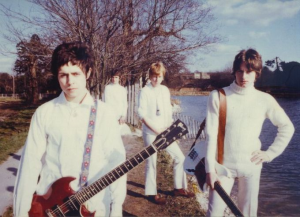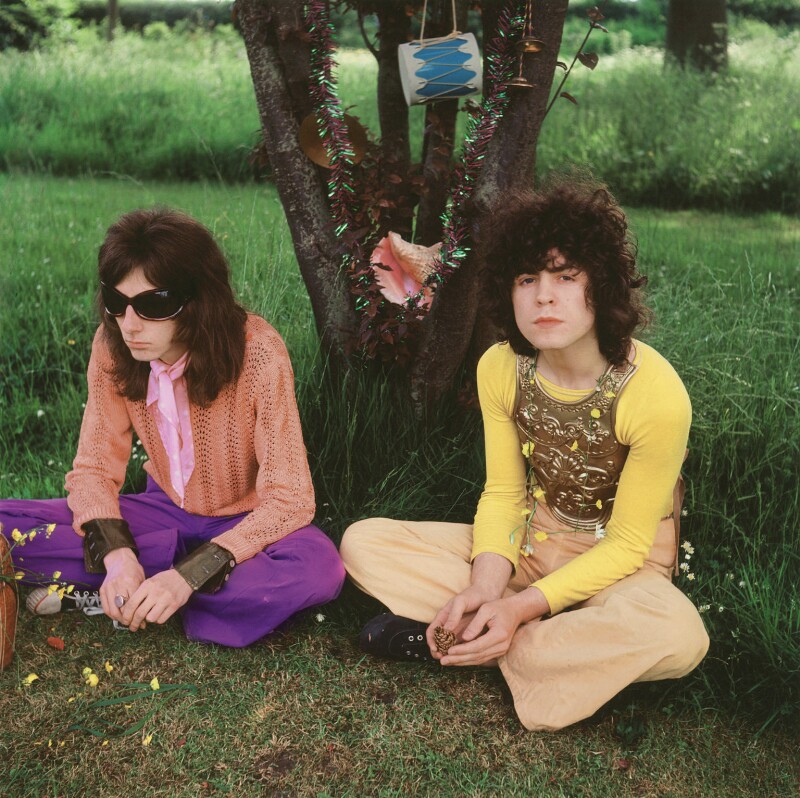Marc's early Music and his destiny to be a star
1964–1967: Early career In 1964, Bolan met his first manager, Geoffrey Delaroy-Hall, and recorded a slick commercial track backed by session musicians called "All at Once" (a song very much in the style of his youthful hero, Cliff Richard, the "English Elvis")
Bolan then changed his stage name to Toby Tyler when he met and moved in with child actor Allan Warren, who became his second manager. This encounter afforded Bolan a lifeline to the heart of show business, as Warren saw Bolan's potential while he spent hours sitting cross-legged on Warren's floor playing his acoustic guitar. Bolan at this time liked to appear wearing a corduroy peaked cap similar to his then -current source of inspiration, Bob Dylan. A series of photographs was commissioned with photographer Michael McGrath, although he recalls that Bolan "left no impression" on him at the time. Warren also hired a recording studio and had Bolan's first acetates cut. Two tracks were later released, the Bob Dylan song "Blowin' in the Wind" and Dion's "The Road I'm On (Gloria)". A version of Betty Everett's "You're No Good" (still unreleased) was later submitted to EMI for a test screening but was turned down.
Warren later sold Bolan's contract and recordings for £200 to his landlord, property mogul David Kirch, in lieu of three months' back rent, but Kirch was too busy with his property empire to do anything for him. A year or so later, Bolan's mother pushed into Kirch's office and shouted at him that he had done nothing for her son. She demanded he tear up the contract and he willingly complied. The tapes of the first two tracks produced during the Toby Tyler recording session vanished for over 25 years before resurfacing in 1991 and selling for nearly $8,000. Their eventual release on CD in 1993 made available some of the earliest of Bolan's known recordings.
He signed to Decca Records in August 1965. At this point his name changed to Marc Bolan via Marc Bowland. There are several accounts of why Bolan was chosen, including that it was derived from James Bolam, that it was a contraction of Bob Dylan, and – according to Bolan himself – that Decca Records chose the name. He recorded his debut single "The Wizard" with the Ladybirds on backing vocals (later finding fame with Benny Hill), and studio session musicians playing all the instruments. "The Wizard", Bolan's first single, was released on 19 November 1965. It featured Jimmy Page and Big Jim Sullivan, was produced by Jim Economides, with music director Mike Leander. Two solo acoustic demos recorded shortly afterwards by the same team ("Reality" and "Song for a Soldier") have still only been given a limited official release in 2015 on seven-inch vinyl. Both songs are in a folk style reminiscent of Dylan and Donovan. A third song, "That's the Bag I'm In", written by New York folk singer and Dylan contemporary Fred Neil, was also committed to tape, but has not yet been released. In June 1966, a second official single was also released, with session-musician accompaniment, "The Third Degree", backed by "San Francisco Poet", Bolan's paean to the beat poets. Neither song made the charts.
In 1966, Bolan turned up at Simon Napier-Bell's front door with his guitar and proclaimed that he was going to be a big star and he needed someone to make all of the arrangements. Napier-Bell invited Bolan in and listened to his songs. A recording session was immediately booked and the songs were very simply recorded (most of them were not actually released until 1974, on the album The Beginning of Doves). Only "Hippy Gumbo", a sinister-sounding, baroque folk-song, was released at the time as Bolan's third unsuccessful single. One song, "You Scare Me to Death", was used in a toothpaste advertisement. Some of the songs also resurfaced in 1982, with additional instrumentation added, on the album You Scare Me to Death. Napier-Bell managed the Yardbirds and John's Children and was at first going to slot Bolan into the Yardbirds. In early 1967 he eventually settled instead for John's Children because they needed a songwriter and he admired Bolan's writing ability. The band achieved some success as a live act but sold few records. A John's Children single written by Bolan called "Desdemona" was banned by the BBC for its line "lift up your skirt and fly".

His tenure with the band was brief. When the band split following an ill-fated German gig with the Who, Bolan took some time to reassess his situation. Bolan's imagination was filled with new ideas and he began to write fantasy novels (The Krakenmist and Pictures Of Purple People) as well as poems and songs, sometimes finding it hard to separate facts from his own elaborate myth – he famously claimed to have spent time with a wizard in Paris who gave him secret knowledge and could levitate. The time spent with him was often alluded to but remained "mythical". In reality the wizard was probably American actor Riggs O'Hara with whom Bolan made a trip to Paris in 1965. Given time to reinvent himself, after John's Children, Bolan's songwriting took off and he began writing many of the poetic and neo-romantic songs that appeared on his first albums with T. Rex
1967–1970: Tyrannosaurus Rex John's Children collapsed when, among other problems, the band's equipment had been repossessed by their label Track Records. Bolan, unperturbed, rallied to create Tyrannosaurus Rex, his own rock band together with guitarist Ben Cartland, drummer Steve Peregrin Took and an unknown bass player. Napier-Bell recalled of Bolan: "He got a gig at the Electric Garden then put an ad in Melody Maker to get the musicians. The paper came out on Wednesday, the day of the gig. At three o'clock he was interviewing musicians, at five he was getting ready to go on stage.... It was a disaster. He just got booed off the stage." Following this concert, Bolan pared the band down to just himself and Took, and they continued as a psychedelic-folk rock acoustic duo, playing Bolan's songs, with Took playing assorted hand and kit percussion and occasional bass to Bolan's acoustic guitars and voice. Napier-Bell said of Bolan that after the first disastrous electric gig, "He didn't have the courage to try it again; it really had been a blow to his ego... Later he told everyone he'd been forced into going acoustic because Track had repossessed all his gear. In fact he'd been forced to go acoustic because he was scared to do anything else." The original version of Tyrannosaurus Rex with Took released three albums; two reached the top fifteen in the UK Albums Chart. They also had a top 40 hit "Debora" in 1968. They were supported with airplay by BBC Radio 1 DJ John Peel. One of the highlights of this era was when the duo played at the first free Hyde Park concert in 1968. Although the free-spirited, drug-taking Took was fired from the group after their first American tour, they were a force within the hippie underground scene while they lasted. Their music was filled with Bolan's otherworldly poetry. In 1969, Bolan published his first and only book of poetry entitled The Warlock of Love. Although some critics dismissed it as self-indulgence, it was full of Bolan's florid prose and wordplay, selling 40,000 copies and in 1969–70 became one of Britain's best-selling books of poetry. It was reprinted in 1992 by the Tyrannosaurus Rex Appreciation Society. In keeping with his early rock and roll interests, Bolan began bringing amplified guitar lines into the duo's music, buying a white Fender Stratocaster decorated with a paisley teardrop motif from Syd Barrett. After replacing Took with Mickey Finn, he let the electric influences come forward even further on A Beard of Stars, the final album to be credited to Tyrannosaurus Rex. It closed with the song "Elemental Child", featuring a long electric guitar break influenced by Jimi Hendrix.

Next Marc's Trextasy the birth of a legend .................